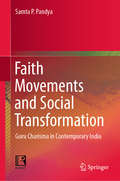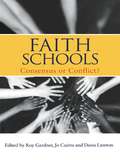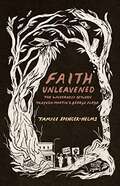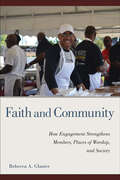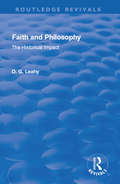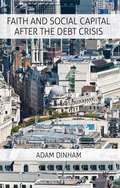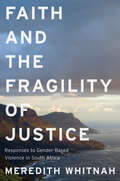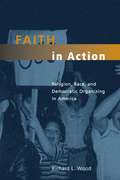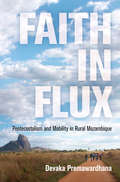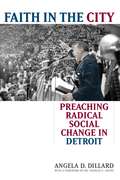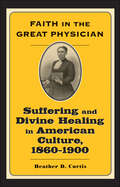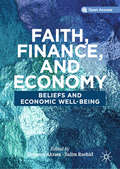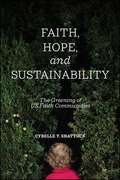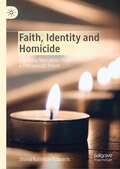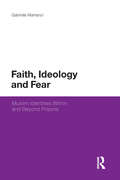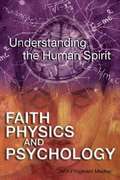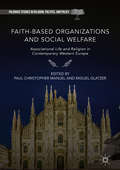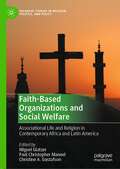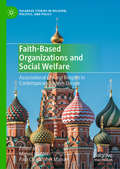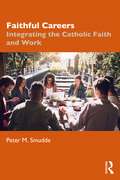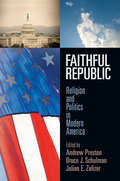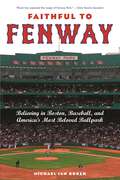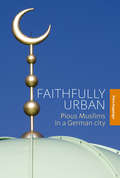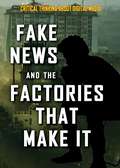- Table View
- List View
Faith Movements and Social Transformation: Guru Charisma In Contemporary India
by Samta P. PandyaThis book examines the role of Hindu-inspired faith movements (HIFMs) in contemporary India as actors in social transformation. It further situates these movements in the context of the global political economy where such movements cross national boundaries to locate believers among the Hindu diaspora and others. In contemporary neoliberal India, HIFMs have become important actors, and they realize themselves by making public assertions through service. The four pillars of the contemporary presence of such movements are: gurus, sociality, hegemony and social transformation. Gurus, who spearhead these movements, create a matrix of possible meanings in their public discourses which their followers pick up to create messages of personal and social change. Sociality is a core strategy of proliferation across such movements and implies social service, which is qualified by memories of the guru and what they are believed to embody. Hegemony is reflected in the fact that social service in such movements often ominously imbibes right-wing or far-right Hinduism. They propose a model of Hindu-inspired social transformation, involving faith building into and transforming the civil society. The book discusses in a nuanced way several Hindu-inspired faith movements of various hues which have made national and international impact.This topical book is of interest to students and researchers in the fields of sociology, anthropology, social work, and social psychology, with a special interest in the study of religious movements.
Faith Schools: Consensus or Conflict?
by Roy Gardner Jo Cairns Denis LawtonUntil fairly recently the separation of pupils according to religion was felt to be compatible with a comprehensive education. That consensus no longer holds and there is a strong positive lobby either to absorb faith schools altogether within the state system or at least to dilute their membership ensuring they include children from other faiths, or no faith at all. This book addresses the current concerns, questions and interest surrounding the legitimacy, support and intended expansion of faith schools. Divided into five sections, it includes chapters on: * the legal frameworks for faith schools and the rights of the child* faith-based schools in the UK, Northern Ireland, France and the USA* the impact of faith schools on pupil performance* faith schools, religious education and citizenship* political and research issues. Faith Schools: Consensus or Conflict? is of interest to educators, policymakers, researchers and students of education, religion and sociology.
Faith Unleavened: The Wilderness Between Trayvon Martin & George Floyd
by Tamice Spencer-HelmsIn her powerhouse debut, Tamice Spencer-Helms exposes the leaven of whiteness that pervades so much of Christianity in America today. At a young age, the Black church introduced her to a God of love, empowerment, and joy. But an encounter with White Jesus set her on a path that nearly destroyed her faith altogether. Persistent police brutality against Black people, and the white church's persistent excuses for it, forced Spencer-Helms to carefully identify how the idol of whiteness keeps Christians captive, and how we can burn the idol down. With brilliant prose and gripping storytelling, she takes us on the painful but liberating journey of extracting the leaven from spirituality, and rediscovering the parts of ourselves that a colonized Christianity seeks to suppress. This book will confront readers with the stomach-turning reality of constant injustice, but also delight and overwhelm them with the freedom of Christ.
Faith and Community: How Engagement Strengthens Members, Places of Worship, and Society (Religious Engagement in Democratic Politics)
by Rebecca A. GlazierPlaces of worship are important anchor institutions in communities, helping to create social capital through discussion groups, soup kitchens, and neighborhood clean-ups. While congregations face increasing pressures, from declining attendance to political polarization, community engagement is an overall positive for their members and for democracy. Faith and Community shows the benefits of religious people taking action in their communities. Through more than a decade of multi-method data collection, Rebecca Glazier surveyed over 4,000 congregants and nearly 500 clergy in Little Rock, Arkansas to gather opinions from members and leaders on community issues and engagement. Together with interviews and case studies, her findings indicate that active congregants are happier and more civically involved. Faith and Community provides valuable insights into the relationship between religion and community engagement. The data illustrates how community engagement benefits individuals, congregations, and democracy and offers one solution to what ails religion in America today.
Faith and Philosophy: The Historical Impact (Routledge Revivals Ser.)
by D. G. LeahyThis title was first published in 2003. This work examines how Christian faith has historically impacted the notion of Nous or divine mind in Western thought up to and including the present. Christian faith is seen to have inaugurated an essential transformation over time of the ancient notion of divine mind and of thought in general. Beginning with an examination of Aristotle's notion of essence, Plato's creation myth in the "Timaeus", and Plotinus' "One", it is shown how faith in the hands of Augustine and Aquinas fundamentally reshaped Western thought and made possible in the modern period the radical subjectivity of Descartes brought to perfection by Kant and Hegel. The strenuous counter-thinking of Kierkegaard, Nietzsche and Levinas is closely compared to its disarming alternative, the thinking of Jefferson, Emerson and C.S. Peirce the father of American pragmatism.
Faith and Social Capital After the Debt Crisis
by Adam DinhamThis book explores what becomes of faiths when seen as social capital. In the grip of the current debt crisis, where the social and capital seem increasingly unbalanced, this book examines whether faiths can help rebalance society through drawing communities together.
Faith and the Fragility of Justice: Responses to Gender-Based Violence in South Africa
by Meredith WhitnahSouth Africa has repeatedly made international headlines because of its high rates of gender-based violence. In the midst of a wide range of responses to the problem, an important voice has been largely absent. Why are the religious groups that had famously protested the racial violence of apartheid faltering in their response to gendered violence in the democracy? Faith and the Fragility of Justice answers this question through a deep dive into the public discourse of three Protestant Christian organizations that had been adamant about a theological mandate to challenge apartheid, but have varied in their responses to gender-based violence in the democracy. The central argument of the book is that the organizations’ theological convictions intersect with their posture toward various social groups to shape their actions. In making this argument, Meredith Whitnah demonstrates that religious beliefs are a central dimension of institutional processes that sustain or challenge social inequality and violence.
Faith in Action: Religion, Race, And Democratic Organizing in America
by Richard L. WoodOver the past fifteen years, associations throughout the U. S. have organized citizens around issues of equality and social justice, often through local churches. But in contrast to President Bush's vision of faith-based activism, in which groups deliver social services to the needy, these associations do something greater. Drawing on institutions of faith, they reshape public policies that neglect the disadvantaged. To find out how this faith-based form of community organizing succeeds, Richard L. Wood spent several years working with two local groups in Oakland, California--the faith-based Pacific Institute for Community Organization and the race-based Center for Third World Organizing. Comparing their activist techniques and achievements, Wood argues that the alternative cultures and strategies of these two groups give them radically different access to community ties and social capital. Creative and insightful, Faith in Action shows how community activism and religious organizations can help build a more just and democratic future for all Americans.
Faith in Flux: Pentecostalism and Mobility in Rural Mozambique (Contemporary Ethnography)
by Devaka PremawardhanaAnthropologist Devaka Premawardhana arrived in Africa to study the much reported "explosion" of Pentecostalism, the spread of which has indeed been massive. It is the continent's fastest growing form of Christianity and one of the world's fastest growing religious movements. Yet Premawardhana found no evidence for this in the province of Mozambique where he worked. His research suggests that much can be gained by including such places in the story of global Christianity, by shifting attention from the well-known places where Pentecostal churches flourish to the unfamiliar places where they fail.In Faith in Flux, Premawardhana documents the ambivalence with which Pentecostalism has been received by the Makhuwa, an indigenous and historically mobile people of northern Mozambique. The Makhuwa are not averse to the newly arrived churches—many relate to them powerfully. Few, however, remain in them permanently. Pentecostalism has not firmly taken root because it is seen as one potential path among many—a pragmatic and pluralistic outlook befitting a people accustomed to life on the move.This phenomenon parallels other historical developments, from responses to colonial and postcolonial intrusions to patterns of circular migration between rural villages and rising cities. But Premawardhana primarily attributes the religious fluidity he observed to an underlying existential mobility, an experimental disposition cultivated by the Makhuwa in their pre-Pentecostal pasts and carried by them into their post-Pentecostal futures. Faith in Flux aims not to downplay the influence of global forces on local worlds, but to recognize that such forces, "explosive" though they may be, never succeed in capturing the everyday intricacies of actual lives.
Faith in the City: Preaching Radical Social Change in Detroit
by Angela D. DillardSpanning more than three decades and organized around the biographies of Reverends Charles A. Hill and Albert B. Cleage Jr., Faith in the City is a major new exploration of how the worlds of politics and faith merged for many of Detroit’s African Americans—a convergence that provided the community with a powerful new voice and identity. While other religions have mixed politics and creed, Faith in the City shows how this fusion was and continues to be particularly vital to African American clergy and the Black freedom struggle. Activists in cities such as Detroit sustained a record of progressive politics over the course of three decades. Angela Dillard reveals this generational link and describes what the activism of the 1960s owed to that of the 1930s. The labor movement, for example, provided Detroit’s Black activists, both inside and outside the unions, with organizational power and experience virtually unmatched by any other African American urban community.
Faith in the Great Physician: Suffering and Divine Healing in American Culture, 1860–1900 (Lived Religions)
by Heather D. CurtisRecipient of the Frank S. and Elizabeth D. Brewer Prize of the American Society of Church History for 2007Faith in the Great Physician tells the story of how participants in the evangelical divine healing movement of the late nineteenth century transformed the ways Americans coped with physical affliction and pursued bodily health. Examining the politics of sickness, health, and healing during this period, Heather D. Curtis encourages critical reflection on the theological, cultural, and social forces that come into play when one questions the purpose of suffering and the possibility of healing.Curtis finds that advocates of divine healing worked to revise a deep-seated Christian ethic that linked physical suffering with spiritual holiness. By engaging in devotional disciplines and participating in social reform efforts, proponents of faith cure embraced a model of spiritual experience that endorsed active service, rather than passive endurance, as the proper Christian response to illness and pain. Emphasizing the centrality of religious practices to the enterprise of divine healing, Curtis sheds light on the relationship among Christian faith, medical science, and the changing meanings of suffering and healing in American culture.
Faith in the Great Physician: Suffering and Divine Healing in American Culture, 1860–1900 (Lived Religions)
by Heather D. CurtisThis history of evangelical faith healing in nineteenth-century America examines the nation’s shifting attitudes about sickness, suffering, and health. Faith in the Great Physician tells the story of how participants in the divine healing movement transformed the ways Americans coped with physical affliction and pursued bodily wellbeing. Heather D. Curtis offers critical reflection on the theological, cultural, and social forces that come into play when one questions the purpose of suffering and the possibility of healing.Belief in divine healing ran counter to a deep-seated Christian ethic that linked physical suffering with spiritual holiness. By engaging in devotional disciplines and participating in social reform efforts, proponents of faith cure embraced a model of spiritual experience that endorsed active service, rather than passive endurance, as the proper Christian response to illness and pain.Emphasizing the centrality of religious practices to the enterprise of divine healing, Curtis sheds light on the relationship among Christian faith, medical science, and the changing meanings of suffering and healing in American culture.Recipient of the Frank S. and Elizabeth D. Brewer Prize of the American Society of Church History for 2007
Faith, Finance, and Economy: Beliefs and Economic Well-Being
by Tanweer Akram Salim RashidThis open access book seeks to foster a multidisciplinary understanding of the ties between faith, financial intermediation, and economic progress by drawing on research across economics, finance, history, philosophy, ethics, theology, public policy, law, and other disciplines. Chapters in this edited volume examine themes as consequential as economic opportunities, real world outcomes and faith; values and consumerism; faith, financial intermediation and economic development in Western and Islamic societies; and the impact of faith issues on US workers, on the workplace and religion, and on the characteristics of good wealth. Though engaging with difficult questions, this book is written in an accessible style to be enjoyed by laypeople and scholars alike.
Faith, Hope, and Sustainability: The Greening of US Faith Communities (SUNY series on Religion and the Environment)
by Cybelle T. ShattuckFaith, Hope, and Sustainability explores the experiences of fifteen faith communities striving to care for the earth and live more sustainably. A church in Maine partners with fishermen to create the first community-supported fishery so they can make a living without overfishing. A Jewish congregation in Illinois raises extra funds to construct a green synagogue that expresses their religious mission to heal the world. Benedictine sisters in Wisconsin adopt caring for the earth as part of their mission and begin restoring one hundred acres of prairie, reviving their community in the process. Presbyterians in Virginia, dismayed by air pollution in Shenandoah National Park, take courage from their conviction that "God does not call us to do little things" and advocate for improved national air pollution policies. Stories such as these highlight the variety of environmental actions that people of faith are enacting through congregational venues.Beyond simply narrating inspiring stories, however, this book compares these case studies to explore in detail the processes through which the communities took action. In addition to examining why faith communities engage in earth care, Cybelle T. Shattuck explores how they put intention into action and how the congregational context affects what they do. She introduces an analytical framework focusing on four domains of activity—champions, faith leaders, congregations, and organizations—to explicate the full range of factors that influence how initiatives develop and whether sustainability becomes embedded in these religious organizations. Both the framework and the information on process presented in this book will be highly useful to scholars and to people of faith interested in implementing an earth-care ethic through sustainability programs.
Faith, Identity and Homicide: Exploring Narratives from a Therapeutic Prison
by Shona Robinson-EdwardsThis book explores the role that religion plays in the lives of imprisoned homicide offenders. Drawing on interviews in an English prison, the author examines how they narrate their life stories and how religion intersects with other categories to rebuild their personal identities after committing a crime and being labelled as murderers or killers. This book seeks to bridge the gap between macro and micro phenomena, examining religion as both a social institution and a personal experience. It also explores the mediating role of institutions with regards to the nature and extent of their influence upon individual choices and actions, and provides insights into the nature of the therapeutic prison. It seeks to create some clarity of understanding the complex nature of religiosity, narrative, identity, desistance and rehabilitation whilst critically examining elements of social identity that may restrict or enhance this process. It provides a series of recommendations for organisations working with convicted homicide offenders/offenders and speaks to academics and practitioners in the fields of criminology, sociology, psychology and religious/theological studies.
Faith, Ideology and Fear: Muslim Identities Within and Beyond Prisons
by Gabriele MarranciBased on four years anthropological research within prisons and Muslim communities in the UK, this book offers a unique discussion of the relationship between the experience of prison among Muslims and the formation of religious identity. Gabriele Marranci thoroughly examines Muslim religious life in prison, the work of Muslim chaplains and imams (and the overall impact that they have on Muslim prisoners), providing an analysis of the current prison policies aiming to prevent radicalisation, and discusses the counterproductive results of an increasing young Muslim presence in prisons, as well as the reaction of the Muslim communities to this increase. Marranci suggests that the prison environment, and increasing restrictions therein, are linked to the fear of radicalization, and are facilitating identity processes in which Islam turns into an ideology. This important study goes on to make a thorough examination of the lives of former Muslim prisoners, showing how they are particularly vulnerable to extremists' recruitment, and explaining the dynamics which have led, in certain cases, to their recommitting offences, or embarking on a path of radicalization.
Faith, Physics and Psychology: Rethinking Society and the Human Spirit
by John Fitzgerald MedinaOn religion, spirituality, and new society. Despite the progress of Western Civilization in economic, scientific, and other areas, a lack of corresponding progress with respect to spiritual life has left much of society feeling disoriented and unbalanced. Medina's insight sheds light on ways to address this imbalance. The ultimate goal of this examination is to present a path toward a prosperous global civilization that fulfills humanity's physical, psychological, and spiritual needs.
Faith-Based Organizations and Social Welfare: Associational Life And Religion In Contemporary Western Europe (Palgrave Studies in Religion, Politics, and Policy)
by Paul Christopher Manuel Miguel GlatzerThis volume examines the role and function of religious-based organizations in strengthening associational life in a representative sample of West European countries: newly democratized and long-established democracies, societies with and without a dominant religious tradition, and welfare states with different levels and types of state-provided social services. It asks how faith-based organizations, in a time of economic crisis, and with declining numbers of adherents, might contribute to the deepening of democracy. Throughout, the volume invites social scientists to consider the on-going role of faith-based organizations in Western European civil society, and investigates whether the concept of muted vibrancy aids our theoretical understanding.
Faith-Based Organizations and Social Welfare: Associational Life and Religion in Contemporary Africa and Latin America (Palgrave Studies in Religion, Politics, and Policy)
by Christine A. Gustafson Paul Christopher Manuel Miguel GlatzerThe case studies in this volume examine the activities of faith-based institutions in a representative sample of African and Latin American countries, including societies with and without a dominant religious tradition, and states with different levels and types of government-provided social services. Among other questions, the chapters examine the types of social service activities faith-based organizations engage in; their effect on civil society and democratic processes; their influence on the character of local and national communities; and what new pressures would be brought to bear on state-provided services if these faith-based organizations ceased to exist.
Faith-Based Organizations and Social Welfare: Associational Life and Religion in Contemporary Eastern Europe (Palgrave Studies in Religion, Politics, and Policy)
by Paul Christopher Manuel Miguel GlatzerThis volume seeks to understand the role and function of religious-based organizations in strengthening associational life through the provision of social services, thereby legitimizing a new role for faith in the formerly secular public sphere. Specifically, we explore how a church in a postcommunist setting, during periods of economic growth and recession in the wake of transitions to capitalism, and with varied numbers of adherents, might contribute to welfare services in a new political regime with freedom of religion. Put another way, what new pressures would be placed on the secular welfare state if religious organizations (Orthodox, Catholic, Protestant, Muslim, others) simply stopped offering their services? By examining public perceptions of the church, changing dynamics of religiosity, and church-state-civil society relations, the volume places these issues in context.
Faithful Careers: Integrating the Catholic Faith and Work
by Peter M. SmuddeIn Faithful Careers Peter M. Smudde contends that God calls us to live an "integrated life" that unifies both the spiritual and the secular aspects of life. As an introduction to integrating the Catholic faith with one’s work, this book answers, in the Catholic context, basic questions of what work is, why work is important, who we are as workers, how may we have fruitful careers, where may we find help about faith-work integration, and when we should take next steps toward better integrating our work and the Catholic faith. Smudde demonstrates how the Catholic faith truly does apply to our labor, and that our lives depend on that labor, by putting forth particular matters of the faith that pertain to faithful careers. He then puts into real-world context, pertinent teachings, concepts, principles, practices, and other means the Catholic Church provides for us, so that those lessons can be practically applied on a daily basis. Sources such as the Bible and writings of the saints, popes, contemporary Catholic spiritual writers, apologists, and scholars are applied to strengthen the support made about the book’s content. Catholic professionals at all stages of their careers will welcome this insightful book, which explores the call to put spirituality in the foreground—to obtain ever-deeper faith and, thereby, greater integration of faith in everyday life and career.
Faithful Republic: Religion and Politics in Modern America
by Bruce J. Schulman Julian E. Zelizer Andrew PrestonDespite constitutional limitations, the points of contact between religion and politics have deeply affected all aspects of American political development since the founding of the United States. Within partisan politics, federal institutions, and movement activism, religion and politics have rarely ever been truly separate; rather, they are two forms of cultural expression that are continually coevolving and reconfiguring in the face of social change. Faithful Republic explores the dynamics between religion and politics in the United States from the early twentieth century to the present. Rather than focusing on the traditional question of the separation between church and state, this volume touches on many aspects of American political history, addressing divorce, civil rights, liberalism and conservatism, domestic policy, and economics. Together, the essays blend church history and lived religion to fashion an innovative kind of political history, demonstrating the pervasiveness of religion throughout American political life. Contributors: Lila Corwin Berman, Edward J. Blum, Darren Dochuk, Lily Geismer, Alison Collis Greene, Matthew S. Hedstrom, David Mislin, Andrew Preston, Bruce J. Schulman, Molly Worthen, Julian E. Zelizer.
Faithful to Fenway: Believing in Boston, Baseball, and America’s Most Beloved Ballpark
by Michael Ian BorerAn unforgettable pilgrimage through America's oldest major league ballparkThe Green Monster. Pesky's Pole. The Lone Red Seat. Yawkey Way. To baseball fans this list of bizarre phrases evokes only one place: Fenway Park, home of the Boston Red Sox. Built in 1912, Fenway Park is Americas oldest major league ballpark still in use. In Faithful to Fenway, Michael Ian Borer takes us out to Fenway where we sit in cramped wooden seats (often with obstructed views of the playing field), where there is a hand-operated scoreboard and an average attendance of 20,000 fewer fans than most stadiums, and where every game has been sold out since May of 2003. There is no Hard Rock Café (like Toronto's Skydome), no swimming pool (like Arizona's Chase Field), and definitely no sushi (which has become a fan favorite from Baltimore to Seattle). As Borer tells us in this captivating book, Fenway is short on comfort but long on character.Faithful to Fenway investigates the mystique of the ballpark. Borer, who lived in Boston before and after the Red Sox historic 2004 World Series win, draws on interviews with Red Sox players, including Jason Varitek and Carl Yastrzemski, management, including Larry Lucchino and John Henry, groundskeepers, vendors, and scores of fans to uncover what the park means for Boston and the people who revere it. Borer argues that Fenway is nothing less than a national icon, more than worthy of the banner outside the stadium that proclaims, “America's Most Beloved Ballpark”. Certainly as one of New England's greatest landmarks, Fenway captures the hearts and imaginations of a deferential and devoted public. There are T-shirts, bumper stickers, banners, and snow globes that honor the ballpark. Fenway shows up in popular films, novels, television commercials, and in replicated form in people's backyards—and coming in 2008 to Quincy, Massachusetts, is Mini-Fenway Park, a replica stadium built especially for kids.Full of legendary stories, amusing anecdotes, and the shared triumph and tragedy of the Red Sox and their fans, Faithful to Fenway offers a fresh and insightful perspective, offering readers an unforgettable pilgrimage to the mecca of baseball.
Faithfully Urban: Pious Muslims in a German City
by Petra KuppingerIn the southern German city of Stuttgart lives a pious Muslim population that has merged with the local population to create a meaningful shared existence. In this ethnographic account, the author introduces and examines the lives of ordinary residents, neighborhoods, and mosque communities to analyze moments and spaces where Muslims and non-Muslims engage with each other and accommodate their respective needs. These accounts show that even in the face of resentment and discrimination, this pious population has indeed become an integral part of the urban community.
Fake News and the Factories that Make It (Critical Thinking About Digital Media)
by Kristina Lyn HeitkampOnce on the fringe, fake news has become mainstream. From bogus social media accounts to Russian troll factories, phony news muddies the social and political discourse, and is a threat to our democracy. This high-interest book defines fake news and reveals the people behind the spread of disinformation. This text directly correlates with state journalism standards about developing media literacy. Readers will also glimpse the future of fake news and the alarming technologies used to make it, such as face-morphing technology. This book will help readers navigate the messy world of fake news.
